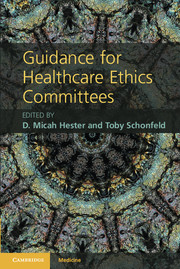Book contents
- Frontmatter
- Contents
- Contributors
- Preface
- Section 1 The Context of Healthcare Ethics Committee Work
- 1 Introduction to healthcare ethics committees
- 2 Brief introduction to ethics and ethical theory
- 3 Healthcare ethics committees and the law
- 4 Cultural and religious issues in healthcare
- Section 2 Consultation
- Section 3 Policy Development and Organizational Issues
- Section 4 Educating Others
- Index
- References
3 - Healthcare ethics committees and the law
Published online by Cambridge University Press: 05 August 2012
- Frontmatter
- Contents
- Contributors
- Preface
- Section 1 The Context of Healthcare Ethics Committee Work
- 1 Introduction to healthcare ethics committees
- 2 Brief introduction to ethics and ethical theory
- 3 Healthcare ethics committees and the law
- 4 Cultural and religious issues in healthcare
- Section 2 Consultation
- Section 3 Policy Development and Organizational Issues
- Section 4 Educating Others
- Index
- References
Summary
Objectives
To become familiar with laws that mandate the creation and use of some ethics committees.
To become familiar with the areas of law that afect ethics committees’ deliberations.
To understand the importance of becoming familiar with your own state’s law.
Case
Tina is an 11-year-old HIV+ girl. She acquired her HIV at birth, from her infected mother, Barbara. (Barbara had not sought medical care during her pregnancy.) Barbara and Tina moved into the community shortly after Tina’s birth, and since then Barbara has been bringing Tina to the hospital’s outpatient pediatrics clinic for HIV treatment and drugs. (Barbara sees a different physician.)
Tina’s viral load is well controlled. Because Tina has been visiting the clinic since before she can remember, she regards her trips there as a normal part of life, and has never questioned them. The clinical team has asked for an ethics consult because Barbara has never told Tina the nature of her illness, and has forbidden the team from informing her, either. Tina’s physicians are concerned that Tina may soon become sexually active; they want her to understand about her HIV status and the risks of transmission. They also point out that Tina is approaching the age at which she could consent on her own to simple medical treatments; they argue that she ought to know her HIV status in order to be able to communicate it to caregivers.
- Type
- Chapter
- Information
- Guidance for Healthcare Ethics Committees , pp. 17 - 24Publisher: Cambridge University PressPrint publication year: 2012



